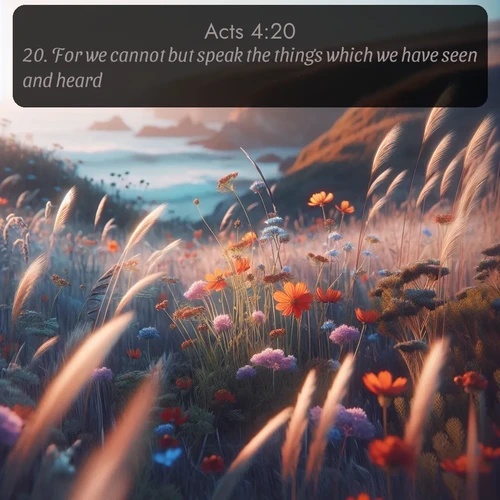Acts 4:20 plusieurs versions / traductions
English Bible Translations
20. For it is not possible for us to keep from saying what we have seen and have knowledge of.
20. for as for us *we* cannot refrain from speaking of the things which we have seen and heard.
German Bible Translations
20. Wir können's ja nicht lassen, daß wir nicht reden sollten, was wir gesehen und gehört haben.
20. denn es ist uns unmöglich, nicht von dem zu reden, was wir gesehen und gehört haben.
French Bible Translations
20. Quant à nous, nous ne pouvons pas ne pas annoncer ce que nous avons vu et entendu.»
20. Car, pour nous, nous ne pouvons pas ne pas parler des choses que nous avons vues et entendues.
20. Car nous ne pouvons que nous ne disions les choses que nous avons vues et ouies.
20. Car pour nous, nous ne pouvons pas ne pas parler des choses que nous avons vues et entendues.
Versions with Strong Codes
Acts 4 / KJV_Strong20. For[G1063] we[G2249] cannot[G1410] [G3756] but[G3361] speak[G2980] the things which[G3739] we have seen[G1492] and[G2532] heard.[G191]
Strong Code definitions
G1063 gar/gar a primary particle; properly, assigning a reason (used in argument, explanation or intensification; often with other particles):--and, as, because (that), but, even, for, indeed, no doubt, seeing, then, therefore, verily, what, why, yet.
G2249 hemeis/hay-mice' nominative plural of G1473; we (only used when emphatic):--us, we (ourselves). see G1473
G1410 dunamai/doo'-nam-ahee of uncertain affinity; to be able or possible:--be able, can (do, + not), could, may, might, be possible, be of power.
G3756 ou/oo, also (before a vowel ouch ookh a primary word; the absolute negative (compare 3361) adverb; no or not:--+ long, nay, neither, never, no (X man), none, (can-)not, + nothing, + special, un(-worthy), when, + without, + yet but. See also 3364, 3372. see G3361 see G3364 see G3372
G3361 me/may a primary particle of qualified negation (whereas G3756 expresses an absolute denial); (adverb) not, (conjunction) lest; also (as an interrogative implying a negative answer (whereas G3756 expects an affirmative one)) whether:--any but (that), X forbear, + God forbid, + lack, lest, neither, never, no (X wise in), none, nor, (can-)not, nothing, that not, un(-taken), without. Often used in compounds in substantially the same relations. See also 3362, 3363, 3364, 3372, 3373, 3375, 3378. see G3756 see G3362 see G3363 see G3364 see G3372 see G3373 see G3375 see G3378
G2980 laleo/lal-eh'-o a prolonged form of an otherwise obsolete verb; to talk, i.e. utter words:-preach, say, speak (after), talk, tell, utter. Compare 3004. see G3004
G3739 hos/hos, including feminine ho ho probably a primary word (or perhaps a form of the article 3588); the relatively (sometimes demonstrative) pronoun, who, which, what, that:-one, (an-, the) other, some, that, what, which, who(m, -se), etc. See also 3757. see G3588 see G3757
G1492 eido/i'-do a primary verb; used only in certain past tenses, the others being borrowed from the equivalent 3700 and 3708; properly, to see (literally or figuratively); by implication, (in the perfect tense only) to know:--be aware, behold, X can (+ not tell), consider, (have) know(-ledge), look (on), perceive, see, be sure, tell, understand, wish, wot. Compare 3700. see G3700&volume=KJV_strong' target='_self' >G3700 see G3708 see G3700&volume=KJV_strong' target='_self' >G3700
G2532 kai/kahee apparently, a primary particle, having a copulative and sometimes also a cumulative force; and, also, even, so then, too, etc.; often used in connection (or composition) with other particles or small words:--and, also, both, but, even, for, if, or, so, that, then, therefore, when, yet.
G191 akouo/ak-oo'-o a primary verb; to hear (in various senses):--give (in the) audience (of), come (to the ears), (shall) hear(-er, -ken), be noised, be reported, understand.
Prédications qui analysent les thèmes Actes 4
Thèmes : La guérison d'un paralytique; Pierre et Jean devant le Sanhédrin; Menaces et prière; La communauté des croyantsActes #6: Pas de duplicité dans l'Eglise
Actes #5: Personne d’autres que Jésus. Actes chapitre 4
Related Sermons discussing Acts 4
Themes : La guérison d'un paralytique; Pierre et Jean devant le Sanhédrin; Menaces et prière; La communauté des croyantsActs #6: No duplicity in the Church. Acts 4:32-5:11 (Acts 4); Patrice Berger
Acts #5: None other than Jesus. Acts chapter 4
see also: Bible Key Verses ; KJV Bible Images, BBE Bible images

